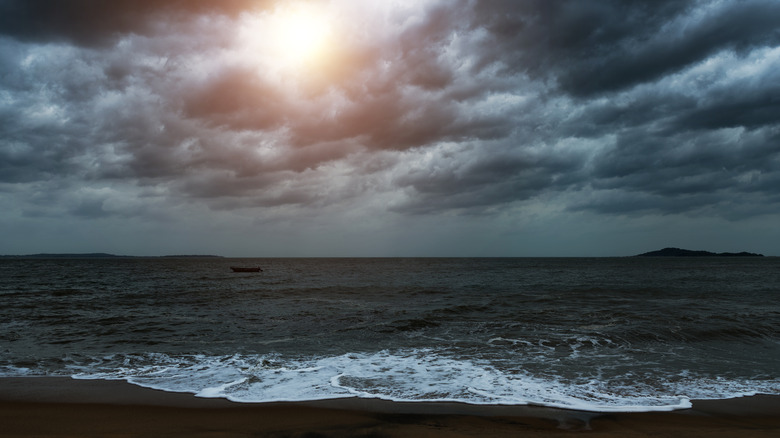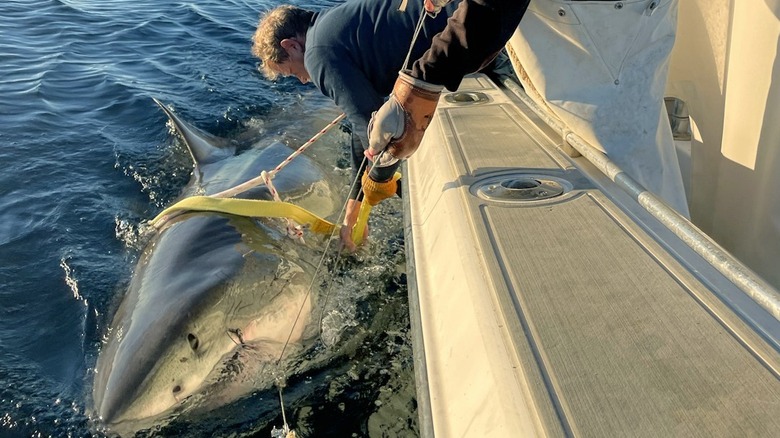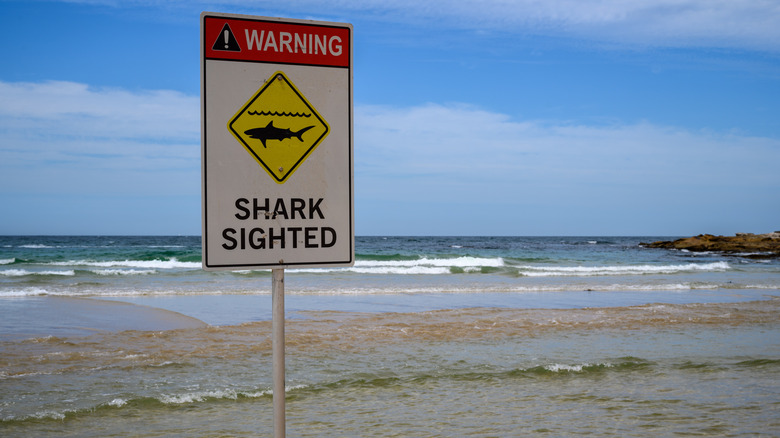The Dangerous Threat Lurking Beneath The Water In North Carolina's Popular Outer Banks
The Cape Hatteras seashore is a yearly favorite Outer Banks beach for family vacations, but some recent headlines may have travelers concerned. That's because a massive great white shark tagged off the Florida coast in early 2025 by OCEARCH — the largest male they've ever recorded in the Atlantic — was recently spotted off the coast of North Carolina. Weighing in at 1,653 pounds and nicknamed Contender, the shark is a whopping 13 feet and 9 inches long.
"Male white sharks are mature at around 11.5 feet and 26 years of age, so Contender at 14 feet is an adult male probably in his early 30's and early in his reproductive life," OCEARCH's chief vet and veterinary scientist Dr. Harley Newton said to Oceanographic. "He is an important part of the effective breeding population and will hopefully contribute to the rebuilding of the western North Atlantic white shark population."
After trailing his movements, Contender recently pinged off the coast near Cape Hatteras and Pamlico Sound, areas busy with beachgoers, kayakers, and surfers enjoying the summer. Scientists say it's all part of a well-known seasonal migration. Contender is making his way from southern wintering grounds toward more temperate summer feeding zones in the northeastern U.S. and Canadian Atlantic waters. But along the way, sharks visit rich waters like those around the Outer Banks so they can feed and stay energized along the long haul.
Why scientists tag sharks like Contender
Experts say that these shark migration patterns are fairly well understood thanks to tags and satellite trackers. The tag on Contender (a SPOT satellite fin tag) only sends location data to OCEARCH when his dorsal fin breaks the water's surface. Meanwhile, a PSAT pop-up tag tracks his movements below the surface and will fall off after six months to give researchers more data on Contender's habits and favorite areas.
That means there are periods when he's underwater and unpinged as well as moments when he's near but not necessarily close enough to shore to pose a direct risk. One extra cool thing about OCEARCH is that shark-curious travelers can check out the organization's real-time tracking app. The free tracker is available for desktop and mobile phones, and users can filter the sharks being tracked by their location, species, or name.
Tracking sharks is an important part of conservation. These apex predators play an essential role in the marine ecosystem, and tracking them can help researchers learn more about the threats and challenges they face. Great white sharks are actually a protected species in the U.S., and everything from overfishing, habitat loss, climate change, and pollution have contributed to their decline.
How to stay safe when sharing the water with sharks
Though learning a shark this size is swimming around popular beaches might sound like a vacation dealbreaker, shark attacks are actually quite rare. According to data from the Florida Museum of Natural History's International Shark Attack File, unprovoked shark bites happen at a very low rate, with Florida having the highest counts. But generally, even the world's most shark-infested beaches have seen few incidents relative to the number of swimmers.
That said, there are some smart tips to protect yourself from sharks while swimming at the beach, especially when a shark is known to be nearby. Avoid dawn or dusk swims, when sharks are often more active or feeding in low light. Swim in groups close to the shore, and don't wear shiny jewelry or enter the water with open wounds. You should also avoid areas with baitfish or seals as well as where people are fishing. Pay attention to local advisories — officials often share warnings when sharks have been tracked near popular swimming areas. Pay attention to your surroundings, too; if you see fish or turtles making a break for it, they may be avoiding a predator.
If you happen to spot a shark, stay calm, and exit the water slowly. Splashing or panicked movement can draw their attention. And in the extremely rare and worst-case scenario that a shark attacks you, experts say you should fight back. Use any gear you have, like a surfboard or paddle, to defend yourself. The shark's eyes, nose, and gills are where you can do the most damage. You will hopefully never have to use this advice, but respecting the environment, being aware, and staying prepared can allow us to share the waters with these impressive creatures peacefully.


